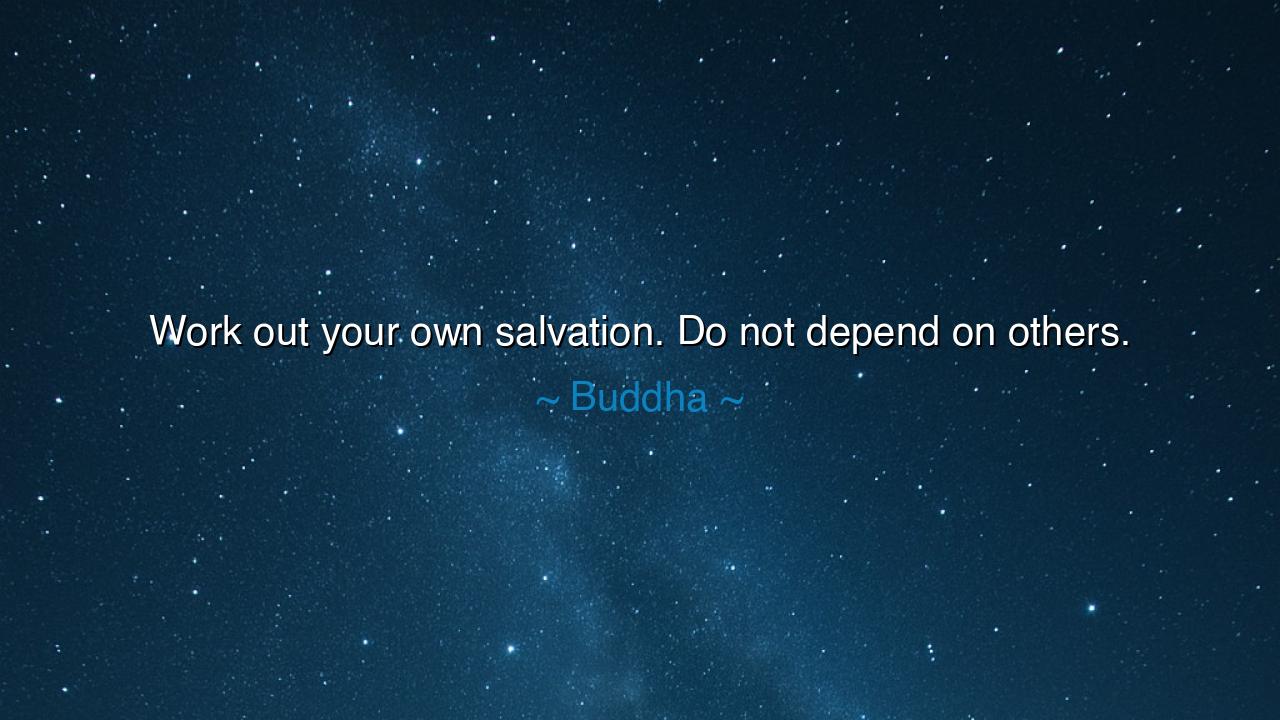
Work out your own salvation. Do not depend on others.






“Work out your own salvation. Do not depend on others.” Thus spoke the Buddha, the Enlightened One, as his final teaching before he departed from the world of form. In this saying lies the eternal call to self-reliance, to inner awakening, to the courage of the soul that walks its own path. The Buddha, who had spent his life guiding others toward liberation, did not promise that salvation could be handed from teacher to disciple like a gift. Instead, he revealed that the true freedom lies within each being—that no priest, no god, no teacher can do the work that the soul itself must do. Each must awaken through effort, through understanding, through direct experience of truth.
The meaning of this quote reaches far beyond religion—it is the essence of the human journey. To “work out your own salvation” is to take responsibility for your life, your choices, your consciousness. It is to cease wandering in the shadows of imitation and to seek the light within your own heart. The Buddha, though revered as the supreme teacher, never asked to be worshipped. He urged his followers to test his words as gold is tested by fire. He knew that truth gained secondhand is fragile, that wisdom borrowed from others fades when tested by suffering. Only the truth discovered through one’s own realization endures. To depend on others for your enlightenment is to remain a child in spirit; to walk your own path is to claim your birthright as a conscious being.
The origin of this teaching lies in the Buddha’s final days, recorded in the Mahaparinibbana Sutta. As he prepared to enter Parinirvana, his disciples wept, afraid of losing their guide. Seeing their sorrow, he said: “Be a lamp unto yourselves. Work out your own salvation. Do not depend on others.” In those words, he offered the final act of compassion: he set them free. He reminded them that the path to liberation was never meant to bind them to his presence, but to lead them to their own awakening. It was as if he had spent a lifetime teaching them to sail, and now, at his parting, he pushed their boats into the open sea of truth.
This wisdom echoes through every age. Consider the story of Helen Keller, who, though blind and deaf from infancy, did not surrender to despair. Guided by her teacher, Anne Sullivan, she learned to touch the world through her fingertips and to hear it through the vibrations of her heart. Yet even Sullivan, her most faithful guide, could not live Helen’s life for her. The teacher could open the door, but Helen herself had to walk through. She had to work out her own salvation—to claim knowledge, patience, and purpose through her own will. And she did, becoming a voice for millions, a living example of the Buddha’s truth: that no one can awaken for another; we must each find the strength to awaken ourselves.
This teaching is not a call to isolation, but to self-mastery. It does not reject compassion or wisdom shared among souls—it simply reminds us that others can show the way, but cannot walk it for us. The spiritual path, like the path of life, demands discipline, courage, and introspection. One may find comfort in teachers, religions, and philosophies, but in the end, the light must come from within. The Buddha’s words tear away the veil of dependency and invite us to stand upright in the strength of our own being. For salvation—whether one calls it enlightenment, peace, or fulfillment—is not found in temples of stone, but in the temple of one’s heart.
The lesson is timeless: take ownership of your spirit. Do not wait for the world to save you, for no savior will arrive who can do what your own awakening must accomplish. Listen to the wisdom of others, but weigh it with the balance of your own reason. Seek guidance, but do not surrender your will. The master may point to the mountain’s summit, but you must climb it yourself, step by step, through the storms and the stillness. In that climb, the soul grows strong; in that effort, wisdom ripens into freedom.
So, my child of the seeking heart, remember these words: “Work out your own salvation. Do not depend on others.” Be a lamp unto yourself. When darkness comes, kindle the light within. When doubt arises, return to your breath, your being, your truth. The teachers of the world may guide you, but they cannot walk for you. The scriptures may inspire you, but they cannot live for you. In the end, salvation is not given—it is earned through understanding, compassion, and self-awareness. And when you finally awaken, you will see as the Buddha saw—that the power to be free was never elsewhere; it was always within you, waiting to be known.






AAdministratorAdministrator
Welcome, honored guests. Please leave a comment, we will respond soon